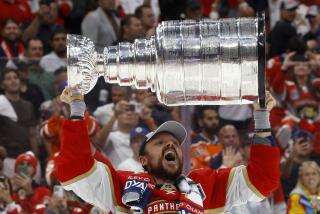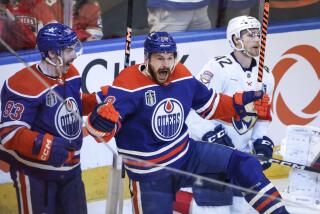Bourque Has Cup to Cap Career
- Share via
DENVER — Ray Bourque finally got his hands on the Stanley Cup, accepting it from Colorado Avalanche captain Joe Sakic a nanosecond after Sakic took it from NHL Commissioner Gary Bettman. Bourque gave it a long, loving smooch at center ice, then set off on a victory skate that was 22 seasons in the making.
At that electric moment, after the Avalanche had finally subdued the New Jersey Devils with a 3-1 victory in the deciding Game 7 of the Stanley Cup Finals, there wasn’t a dry eye on the ice.
A sellout crowd of 18,007 at the Pepsi Center roared in celebration of the future Hall of Fame defenseman, who finally won his first championship.
To be sure, Saturday was the final chapter in a sentimental journey for Bourque, but also for the sports-crazed city of Denver and hockey fans in New England, where Bourque toiled for 20-plus seasons for the Boston Bruins before he was traded late last season to the Avalanche.
“I couldn’t breathe for the last 30 seconds, and it wasn’t because I was tired,” Bourque said at game’s end. “It was just too much and I was trying to hold off the tears, the emotions.”
By tradition, the captain of the winning team accepts the Stanley Cup from the commissioner and takes it for a victory lap around the ice. No dummy, Sakic realized this was not his night to be in the spotlight. He accepted the Cup from Bettman and completed the quickest handoff since John Elway retired from the Denver Broncos.
“It was something Joe wanted to talk about after Game 6, but I wouldn’t let him,” Bourque said, explaining the departure from tradition. “He wanted me to go up there and grab it. I told him to grab it and give it to me. To allow me to take it that quickly says it all about Joe.”
So, Mission 16W has been accomplished. After 16 postseason victories, Bourque, 40, refused to say whether he would retire after his first Stanley Cup championship.
“I’m going to take a little time now to think about the future and get some rest,” he said. “When I make a decision, the hockey world will know about it.”
At game’s end, Colorado General Manager Pierre Lacroix would not answer questions about Bourque’s future. Bourque and Lacroix have a gentleman’s agreement for an option for next season. What’s more, Sakic, defenseman Rob Blake and goaltender Patrick Roy will be unrestricted free agents July 1.
The off-season could bring a dismantling of the Avalanche, which won its second championship since moving from Quebec before the 1995-96 season. Lacroix would not address the team’s future, however.
If Game 7 does indeed prove to be the end of an era in Denver, then what a way for it to conclude.
The Avalanche capped a rally from a 3-2 series deficit by routing the listless Devils, 4-0, Thursday in Game 6 at East Rutherford, N.J. In Game 7, the Avalanche took advantage of a subpar performance by New Jersey goalie Martin Brodeur, clicked on the power play and employed a suffocating defense backstopped by Roy.
Alex Tanguay scored two goals and Sakic added his playoff-leading 13th (on a power play) to account for the Avalanche scoring. Roy, named the Conn Smythe Trophy winner as the most valuable player of the playoffs, stopped all but Petr Sykora’s rocket from the slot while the Devils were on a second-period power play.
In the end, one man overshadowed the Devils’ struggles, the brilliance of the Avalanche’s forwards and Roy’s uncanny ability to shut down New Jersey’s potent attack.
Roy’s MVP award was a record third in his career, but today it’s merely a footnote to Bourque’s victory.
“We truly believed he deserved it,” Tanguay said. “Seeing Ray with the Cup. It doesn’t get any better than that. Everybody in the hockey world had to have tears in their eyes.”
No question, the 11th Game 7 in Stanley Cup Finals history--and only the third in the last 30 years--was a fitting stage for Bourque’s triumph.
Other players had greater impact on the Avalanche’s victory--and not all of them wore a Colorado sweater. But all eyes were focused on Bourque, who was his usual steady self over the course of 29 minutes 35 seconds of ice time Saturday. From start to finish, it was an emotional night for him.
“The national anthem was very tough,” Bourque said. “I had tears in my eyes on the bench a few times. The last 10 minutes took a long time to run down. Lifting the Cup, what a feeling. I just can’t describe it.”
In the final analysis, Bourque and the Avalanche owe a debt of thanks to the Devils. Following their series-long method of operation, the Devils raced to the penalty box as if the Stanley Cup was stashed in there.
New Jersey lost valuable momentum with each penalty. The Devils also lost any hope of a comeback after defenseman Sean O’Donnell needlessly high-sticked Colorado’s Shjon Podein at center ice.
Sakic’s power-play goal, on a blast from the right faceoff circle, gave the Avalanche an insurmountable, 3-0, lead 6:16 into the second period.
“The thing that beat us was the same thing that we were guilty of the whole series--taking stupid penalties,” New Jersey Coach Larry Robinson said. “I mean, this is the seventh game of the finals. If you can’t suck it up for the seventh game of the finals, then you’ve got problems.”
Colorado had no such troubles, helping Bourque complete his quest for hockey’s Holy Grail that began in Boston in 1979.
John Vanbiesbrouck, the Devils’ 37-year-old backup goaltender, ended a nearly two-decade NHL career by announcing his retirement after the game. . . . Police in riot gear sprayed tear gas to disperse thousands of rowdy fans who set small bonfires and danced in the streets of Denver in postgame celebration.
(BEGIN TEXT OF INFOBOX / INFOGRAPHIC)
Stanley Cup Champions
1918: Toronto Arenas
1919: No Decision-x
1920: Ottawa Senators
1921: Ottawa Senators
1922: Toronto St. Patricks
1923: Ottawa Senators
1924: Montreal Canadiens
1925: Victoria Cougars
1926: Montreal Maroons
1927: Ottawa Senators
1928: New York Rangers
1929: Boston Bruins
1930: Montreal Canadiens
1931: Montreal Canadiens
1932: Toronto Maple Leafs
1933: New York Rangers
1934: Chicago Black Hawks
1935: Montreal Maroons
1936: Detroit Red Wings
1937: Detroit Red Wings
1938: Chicago Black Hawks
1939: Boston Bruins
1940: New York Rangers
1941: Boston Bruins
1942: Toronto Maple Leafs
1943: Detroit Red Wings
1944: Montreal Canadiens
1945: Toronto Maple Leafs
1946: Montreal Canadiens
1947: Toronto Maple Leafs
1948: Toronto Maple Leafs
1949: Toronto Maple Leafs
1950: Detroit Red Wings
1951: Toronto Maple Leafs
1952: Detroit Red Wings
1953: Montreal Canadiens
1954: Detroit Red Wings
1955: Detroit Red Wings
1956: Montreal Canadiens
1957: Montreal Canadiens
1958: Montreal Canadiens
1959: Montreal Canadiens
1960: Montreal Canadiens
1961: Chicago Black Hawks
1962: Toronto Maple Leafs
1963: Toronto Maple Leafs
1964: Toronto Maple Leafs
1965: Montreal Canadiens
1966: Montreal Canadiens
1967: Toronto Maple Leafs
1968: Montreal Canadiens
1969: Montreal Canadiens
1970: Boston Bruins
1971: Montreal Canadiens
1972: Boston Bruins
1973: Montreal Canadiens
1974: Philadelphia Flyers
1975: Philadelphia Flyers
1976: Montreal Canadiens
1977: Montreal Canadiens
1978: Montreal Canadiens
1979: Montreal Canadiens
1980: New York Islanders
1981: New York Islanders
1982: New York Islanders
1983: New York Islanders
1984: Edmonton Oilers
1985: Edmonton Oilers
1986: Montreal Canadiens
1987: Edmonton Oilers
1988: Edmonton Oilers
1989: Calgary Flames
1990: Edmonton Oilers
1991: Pittsburgh Penguins
1992: Pittsburgh Penguins
1993: Montreal Canadiens
1994: New York Rangers
1995: New Jersey Devils
1996: Colorado Avalanche
1997: Detroit Red Wings
1998: Detroit Red Wings
1999: Dallas Stars
2000: New Jersey Devils
2001: Colorado Avalanche
x-The series between Montreal and Seattle was called off because of an influenza epidemic.
More to Read
Go beyond the scoreboard
Get the latest on L.A.'s teams in the daily Sports Report newsletter.
You may occasionally receive promotional content from the Los Angeles Times.






